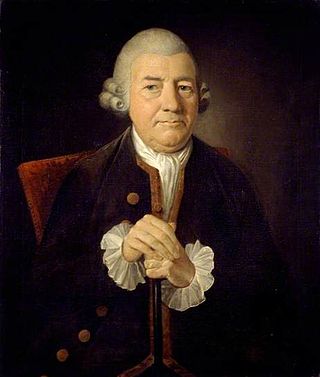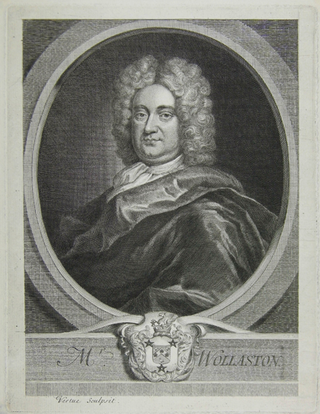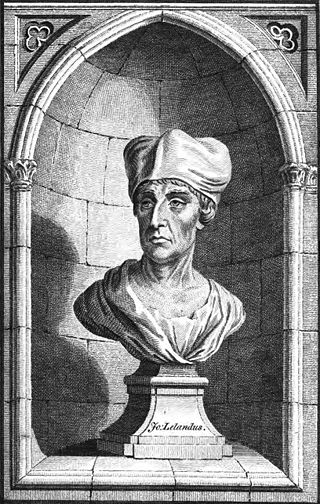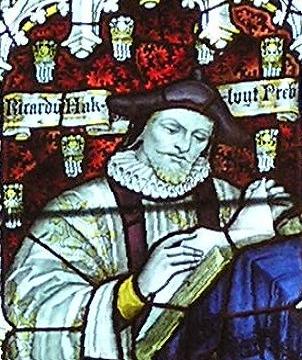Related Research Articles

John Baskerville was an English businessman, in areas including japanning and papier-mâché, but he is best remembered as a printer and type designer. He was also responsible for inventing "wove paper", which was considerably smoother than "laid paper", allowing for sharper printing results.

William Wollaston was a school teacher, Church of England priest, scholar of Latin, Greek, and Hebrew, theologian, and a major Enlightenment era English philosopher. He is remembered today for one book, which he completed two years before his death: The Religion of Nature Delineated. He led a cloistered life, but in terms of eighteenth-century philosophy and the concept of natural religion, he is ranked with British Enlightenment philosophers such as Locke, Berkeley, and Hume.

Matthew Paris, also known as Matthew of Paris, sometimes confused with the nonexistent Matthew of Westminster, was an English Benedictine monk, chronicler, artist in illuminated manuscripts, and cartographer who was based at St Albans Abbey in Hertfordshire. He authored a number of historical works, many of which he scribed and illuminated himself, typically in drawings partly coloured with watercolour washes, sometimes called "tinted drawings". Some were written in Latin, others in Anglo-Norman or French verse.

John Leland or Leyland was an English poet and antiquary.

Richard Bentley FRS was an English classical scholar, critic, and theologian. Considered the "founder of historical philology", Bentley is widely credited with establishing the English school of Hellenism. In 1892, A. E. Housman called Bentley "the greatest scholar that England or perhaps that Europe ever bred".

Thomas Hearne or Hearn was an English diarist and prolific antiquary, particularly remembered for his published editions of many medieval English chronicles and other important historical texts.

Bibliography, as a discipline, is traditionally the academic study of books as physical, cultural objects; in this sense, it is also known as bibliology. English author and bibliographer John Carter describes bibliography as a word having two senses: one, a list of books for further study or of works consulted by an author ; the other one, applicable for collectors, is "the study of books as physical objects" and "the systematic description of books as objects".

Sir John Fortescue, of Ebrington in Gloucestershire, was Chief Justice of the King's Bench and was the author of De Laudibus Legum Angliae, first published posthumously circa 1543, an influential treatise on English law. In the course of Henry VI's reign, Fortescue was appointed one of the governors of Lincoln's Inn three times and served as a Member of Parliament from 1421 to 1437. He became one of the King's Serjeants during the Easter term of 1441, and subsequently served as Chief Justice of the King's Bench from 25 January 1442 to Easter term 1460.
Macrobius Ambrosius Theodosius, usually referred to as Macrobius, was a Roman provincial who lived during the early fifth century, during late antiquity, the period of time corresponding to the Later Roman Empire, and when Latin was as widespread as Greek among the elite. He is primarily known for his writings, which include the widely copied and read Commentarii in Somnium Scipionis about Somnium Scipionis, which was one of the most important sources for Neoplatonism in the Latin West during the Middle Ages; the Saturnalia, a compendium of ancient Roman religious and antiquarian lore; and De differentiis et societatibus graeci latinique verbi, which is now lost. He is the basis for the protagonist Manlius in Iain Pears' book The Dream of Scipio.

Richard Hakluyt was an English writer. He is known for promoting the English colonization of North America through his works, notably Divers Voyages Touching the Discoverie of America (1582) and The Principal Navigations, Voyages, Traffiques and Discoveries of the English Nation (1589–1600).

John Eliot was a Puritan missionary to the American Indians who some called "the apostle to the Indians" and the founder of Roxbury Latin School in the Massachusetts Bay Colony in 1645. In 1660 he completed the enormous task of translating the Eliot Indian Bible into the Massachusett Indian language, producing more than two thousand completed copies.

Edward Carpenter was an English utopian socialist, poet, philosopher, anthologist, an early activist for gay rights and prison reform whilst advocating vegetarianism and taking a stance against vivisection. As a philosopher, he was particularly known for his publication of Civilisation: Its Cause and Cure. Here, he described civilisation as a form of disease through which human societies pass.
Charles Julius Bertram (1723–1765) was an English expatriate in Denmark who "discovered"—and presumably wrote—The Description of Britain, an 18th-century literary forgery purporting to be a mediaeval work on history that remained undetected for over a century. In that time, it was highly influential for the reconstruction of the history of Roman Britain and contemporary Scotland, to the extent of appearing in Gibbon's Decline and Fall of the Roman Empire and being used to direct William Roy's initial Ordnance Survey maps. Bertram "discovered" the manuscript around the age of 24 and spent the rest of his life a successful academic and author. Scholars contested various aspects of the Description, but it was not recognized as an unquestionable forgery until 1846.

Rees's Cyclopædia, in full The Cyclopædia; or, Universal Dictionary of Arts, Sciences, and Literature was an important 19th-century British encyclopaedia edited by Rev. Abraham Rees (1743–1825), a Presbyterian minister and scholar who had edited previous editions of Chambers's Cyclopædia.

Lant Carpenter, Dr. was an English educator and Unitarian minister.
Edward Hall was an English lawyer and historian, best known for his The Union of the Two Noble and Illustre Families of Lancastre and Yorke—commonly known as Hall's Chronicle—first published in 1548. He was also several times a member of the Parliament of England.

Alexander Crombie FRS (1760–1840) was a Scottish Presbyterian minister, schoolmaster and philosopher.
Ronald Brunlees McKerrow, FBA was one of the leading bibliographers and Shakespeare scholars of the 20th century.
Alexander Donaldson was a Scottish bookseller, publisher, and printer. Donaldson was the founding publisher of the weekly newspaper, the Edinburgh Advertiser. He was also known for selling cheap copies of books after their copyright had expired in disregard to London booksellers' opinions on literary property.

John Shirley was an author, translator, and scribe. As a scribe of later Middle English literature, he is particularly known for transcribing works by John Lydgate and Geoffrey Chaucer.
References
- ↑ Gerald Robert Owst: The Destructorium viciorum of Alexander Carpenter, Church Historical Society, Society for Promoting Christian Knowledge, London, 1952, 40 pp.
- ↑ Stephen, Leslie, ed. (1887). . Dictionary of National Biography . Vol. 9. London: Smith, Elder & Co. p. 153.
- ↑ George Watson (ed.): The New Cambridge Bibliography of English Literature, Volume 1, 600-1660. Cambridge: Cambridge University Press, 1974, p. 803.
- ↑ Ludwig Hain: Repertorium Bibliographicum in Usum Scholarum ["Bibliographic Directory for Scholarly Use"], J. G. Cottae Stuttgartiae et Jul. Renouard Lutetiae Parisiorum, 1826, Vol. I, Pt. I, p. 72.
- ↑ John Bale, Scriptorum illustrium maioris Britanniae, quam nunc Angliam et Scotiam vocant, catalogus ["Catalogue of the Famous Writers of Great Britain, now called England and Scotland"], Basel: 1557-1559, vol. II, p. 566.